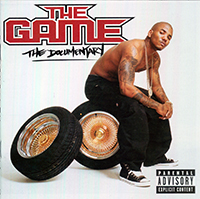'Documentary': a solid effort from Game
By CHHUN SUN
The Game epitomizes a gangsta rapper.
He has the rough past. He grew up in a broken home in Compton, so a natural evolution from his abandonment was an involvement in gangs. He had been shot five times by age 20.
He has the image. Tattoos cover his body. He wears red clothes, like a Cincinnati Reds cap with the brim pulled down over his eyes for a mysterious look.
CD REVIEW
A
The Game
"The Documentary" |
 |
He has the crew. His entourage is deeper than Jerry Springer’s final thoughts.
And his lyrics reflect his style. Before his first release, “The Documentary,” The Game issued challenges to such rappers as Ja Rule, Joe Budden and Guerilla Black, a rapper who shares the same hometown as The Game. So it’s hard not to compare him with 50 Cent, who gained fame by beefing with Ja Rule. It’s the same formula.
That’s probably why The Game is trying to distance himself from the comparison by releasing “The Documentary,” an album, executively produced by Dr. Dre and Eminem, that strives to bring the West Coast back to the forefront of rap music.
West Coast rappers dominated the music world in the early 1990s with Dr. Dre and Snoop Dogg popularizing gangsta music with “Ain’t Nothing But A ‘G’ Thang.” So it’s only fitting that the West Coast’s savior uses the same approach this time around to regain West Coast prominence.
His effort is solid. Yes, he has the typical songs a rapper of his status would create (like the club-ready song “How We Do”), but it’s his lyrics that set him apart.
His voice is very coarse, but his lyrics are even more coarse.
His first single, “Westside Story,” with a stock Dr. Dre beat, takes a punch at Jay-Z — albeit an indirect one.
“I don’t wear button-up shirts or push Maybachs.” His lyrics could be a confession that he doesn’t think those two items, a style Jay-Z made famous, are gangsta-approved.
But the rest of the album has introspective lyrics that go far beyond his tattoos, gangsta persona and comparisons to 50 Cent, whose lyrics are more attuned to the glorification of expensive jewelry, cars that a working person can’t afford and money that doesn’t seem to stop coming his way. (Well, there are a few songs that include the same type of glorifications, but they’re not the main focus on this album.) His lyrics are reflective of his troubled youth.
“Start From Scratch,” a slow-bouncing track with an eerie piano track, has The Game revisiting his past and simply stating that he wouldn’t change anything. The second verse paints a picture of his near-death experience when he was shot.
“Homie, if I could rewind the hands of time/I woulda cut off the PS2 at 12:49/I’m a gangsta, I stay on my grind/Who knew 11 minutes later I’d get shot with my own 9.”
Other songs with that perspective are the title track, “Don’t Worry” and “Church For Thugs.” But it’s “Dreams” and “Like Father, Like Son” that forces listeners to see The Game in a positive light. “Dreams,” a song produced by Kanye West, is an uplifting and inspiring track about his path from a troubled kid to someone who makes dreams possible for his friends. And “Like Father, Like Son” takes the listener on his growth from a boy to a man, describing vividly the day his son was born.
“The Documentary” also has club tracks like “We Ain’t” and thug love songs like “Special,” but it’s how he amalgamates the world around him and the past he endured that makes this Game continue.
|
